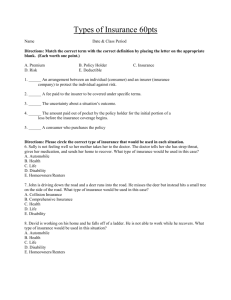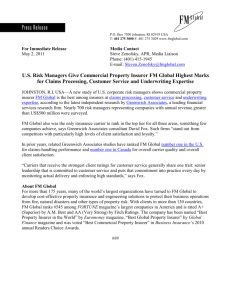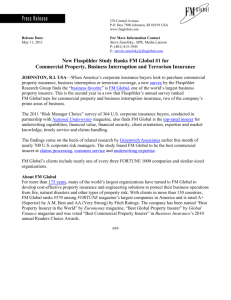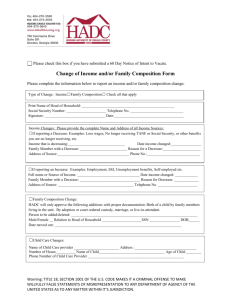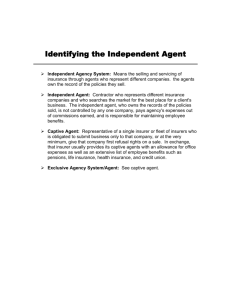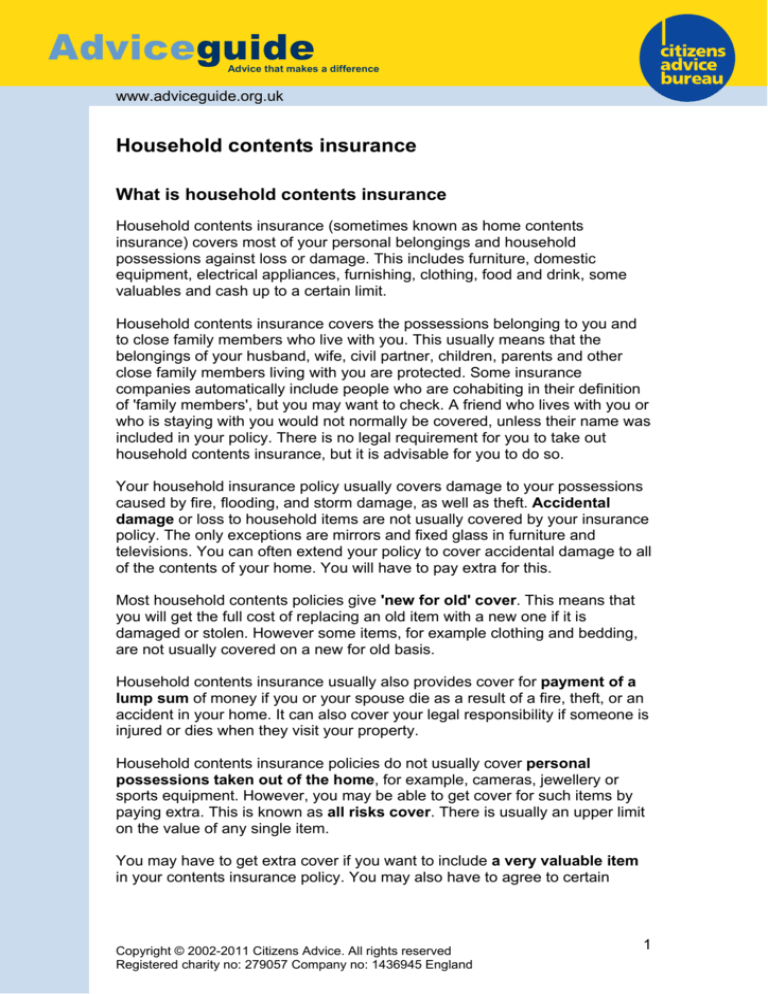
Adviceguide
Advice that makes a difference
www.adviceguide.org.uk
Household contents insurance
What is household contents insurance
Household contents insurance (sometimes known as home contents
insurance) covers most of your personal belongings and household
possessions against loss or damage. This includes furniture, domestic
equipment, electrical appliances, furnishing, clothing, food and drink, some
valuables and cash up to a certain limit.
Household contents insurance covers the possessions belonging to you and
to close family members who live with you. This usually means that the
belongings of your husband, wife, civil partner, children, parents and other
close family members living with you are protected. Some insurance
companies automatically include people who are cohabiting in their definition
of 'family members', but you may want to check. A friend who lives with you or
who is staying with you would not normally be covered, unless their name was
included in your policy. There is no legal requirement for you to take out
household contents insurance, but it is advisable for you to do so.
Your household insurance policy usually covers damage to your possessions
caused by fire, flooding, and storm damage, as well as theft. Accidental
damage or loss to household items are not usually covered by your insurance
policy. The only exceptions are mirrors and fixed glass in furniture and
televisions. You can often extend your policy to cover accidental damage to all
of the contents of your home. You will have to pay extra for this.
Most household contents policies give 'new for old' cover. This means that
you will get the full cost of replacing an old item with a new one if it is
damaged or stolen. However some items, for example clothing and bedding,
are not usually covered on a new for old basis.
Household contents insurance usually also provides cover for payment of a
lump sum of money if you or your spouse die as a result of a fire, theft, or an
accident in your home. It can also cover your legal responsibility if someone is
injured or dies when they visit your property.
Household contents insurance policies do not usually cover personal
possessions taken out of the home, for example, cameras, jewellery or
sports equipment. However, you may be able to get cover for such items by
paying extra. This is known as all risks cover. There is usually an upper limit
on the value of any single item.
You may have to get extra cover if you want to include a very valuable item
in your contents insurance policy. You may also have to agree to certain
Copyright © 2002-2011 Citizens Advice. All rights reserved
Registered charity no: 279057 Company no: 1436945 England
1
Adviceguide
Advice that makes a difference
www.adviceguide.org.uk
conditions, for example, that you should install a burglar alarm. You should tell
your insurer about anything very valuable that you want to insure.
If you rent any of your possessions, for example a television set or a video
recorder, it is advisable to take out insurance cover for these items. This is
because you are legally responsible for any loss or damage which occurs to
them. You can either take out insurance with the rental company, or check
whether your own household contents policy covers them.
If you rent your home and it has some contents belonging to your landlord,
for example furniture or a television set, you may be responsible for any loss
or damage to them and will need to arrange insurance cover. Check your
tenancy agreement to see if this is the case. If the landlord has insured the
items, check to see that the extent of the cover is adequate. It is always
advisable to get insurance cover for your own possessions.
Choosing household contents insurance
Before you take out a household insurance policy, decide how much
insurance you need. This will mean working out the cost of replacing all your
possessions. Ask for quotes from several insurers to help you get the best
deal for your circumstances. You will need to compare:
what each policy covers, and any exclusions (risks which are
specifically excluded, for example, normal wear and tear)
the price of the policy. This is known as the 'premium', and will vary
according to your age, where you live, how much cover you want and
the value of your possessions. The more valuable your possessions
are, the more you will pay for your policy. It is advisable to increase the
value of your insurance to keep pace with the value of your goods.
Some policies are index-linked in line with inflation.
the amount of any excess. This is the first amount of any claim, for
example the first £50, that you will have to pay yourself. Some policies
allow you to pay a higher excess in return for a cheaper premium
any discounts offered
the no claims bonus which increases for every year that no claims are
made on your policy, up to a maximum amount. Most insurers will let
you transfer the discount, if you want to change your insurer. You will
also need to compare the amount by which your no claims bonus
would be reduced if you made a claim
any additional conditions, such as restrictions on your cover if you
leave your home unoccupied for long periods of time.
Copyright © 2002-2011 Citizens Advice. All rights reserved
Registered charity no: 279057 Company no: 1436945 England
2
Adviceguide
Advice that makes a difference
www.adviceguide.org.uk
Things to remember
when you buy insurance, you must give your insurer, or the person who
sells you the insurance, as much information as you possibly can about
anything which might affect their decision to insure you, or how much to
charge
It is your responsibility to inform your insurer of any change in your
circumstances, for example, if you carry out any home improvements to
your property. You should do this as soon as possible, and not wait
until it is time to renew your insurance policy.
Making a claim
If you want to make a claim on your household contents insurance policy:
check that your policy is still current, and that you are covered for the
situation
minimize any further loss or damage by, for example, making
temporary repairs to a broken window
if a crime has been committed or you have lost property, report this to
the police. Keep a note of the crime reference number you are given,
so that you can pass it on to your insurer, if requested
contact your insurer as soon as possible and request a claim form.
complete the claim form carefully and keep a copy
if your claim is substantial, you may want to employ loss assessors to
help you with your claim. Make sure that they are members of the
Institute of Public Loss Assessors. Contact them on: 0844 879 3244.
Get details of all fees and services offered, in writing, before any work
is carried out
keep receipts for any extra costs incurred as a result of loss or
damage. You may be able to claim these back.
When you may not be covered by your household contents
insurance
You may not be covered by your household contents insurance:
for normal wear and tear
if you do not keep to the conditions of your policy, for example if you
have rented out your home (unless forced entry can be shown), or you
have left your home empty for a long period of time
for any exclusions in your policy. These may include specific items
such as jewellery, or other very valuable items. Your policy may also
exclude cover for freezer contents or mobile phones. Check your
policy to see what is covered
Copyright © 2002-2011 Citizens Advice. All rights reserved
Registered charity no: 279057 Company no: 1436945 England
3
Adviceguide
Advice that makes a difference
www.adviceguide.org.uk
if you are underinsured. This means that the contents of your home
are not insured for the full cost of replacement. Your insurer may still
agree to pay a proportion of your claim
if there is a limit on the amount you can be paid out for any single item
if you have to pay an excess
Your insurer may have the right, under the terms of your policy, to provide a
replacement item or repair the item, rather than giving you the money to
replace it. If they do this and the goods are faulty, your insurer is responsible
for dealing with the problem.
Problems can arise where only one item in a set is damaged, for example a
chair in a suite of furniture. It may be impossible either to repair the item or to
find a replacement which matches the set. In these circumstances, your
insurer should pay for the cost of the damaged items and up to half the cost of
replacing the undamaged goods.
How to make a complaint
If you have a problem with an insurance claim, check your policy carefully first
of all to make sure that your insurer is not entitled to withhold all or part of any
payment.
If you want to make a complaint, you should write to them, giving details of
your complaint, and how you would like it to be resolved. If you are not
satisfied with the response, make a formal complaint, using your insurer's
complaints procedure.
If you are not satisfied with the outcome of the formal complaints procedure,
consider taking the complaint further. All insurers must be covered by the
rules of the financial watchdog, the Financial Services Authority (FSA). This
means that if you have a complaint about an insurer, you can take it to the
Financial Ombudsman Service. This is a free service available to
policyholders who have already followed their insurer's complaints procedure.
The Financial Ombudsman will try to resolve the complaint through mediation.
If the dispute cannot be resolved this way, the Financial Ombudsman will
begin a formal investigation. The final decision given at the end of this
investigation is binding on your insurer, but if you do not agree with it, you are
free to take your insurer to court. For more information about the Financial
Ombudsman, you can visit their website at www.financial-ombudsman.org.uk,
or phone:
0800 023 4567 free for people phoning from a "fixed line" (for example,
a landline at home)
0300 123 9 123 free for mobile-phone users who pay a monthly charge
for calls to numbers starting 01 or 02.
Copyright © 2002-2011 Citizens Advice. All rights reserved
Registered charity no: 279057 Company no: 1436945 England
4
Adviceguide
Advice that makes a difference
www.adviceguide.org.uk
If you have tried all the options for resolving your complaint through the
complaints procedures, but have not met with success, or if your insurer is
based outside the UK, you may want to consider taking legal action. However,
you should only consider going to court as a last resort. This is because the
amount of compensation a court may award you could be reduced if you have
not tried other ways of resolving the problem before taking legal action.
If you have tried all the options for resolving your complaint through the
complaints procedures, but have not met with success, or if your insurer is
based outside the UK, you may want to consider taking legal action. However,
you should only consider going to court as a last resort. This is because the
amount of compensation a court may award you could be reduced if you have
not tried other ways of resolving the problem before taking legal action.
Before taking legal action, consider whether you have sufficient evidence. You
will have to prove that your claim is covered by your insurance policy, and you
may have to provide expert evidence.
Your local Citizens Advice Bureau can give you advice about insurance
problems, and on how to take legal action. To search for details of your
nearest CAB, including those that can give advice by e-mail, visit
www.citizensadvice.org.uk.
Other fact sheets that might be helpful
Starting court action
Services
Alternative dispute
resolution
Buildings insurance
Builders
This fact sheet is produced by Citizens Advice, an operating name of The
National Association of Citizens Advice Bureaux. It is intended to provide
general information only and should not be taken as a full statement of the law
on the subject. Please also note that the information only applies to England
and Wales.
This fact sheet was last updated on 05 August 2012, and is reviewed regularly.
If it is some time since you obtained this fact sheet, please contact your local
Citizens Advice Bureau to check if it is still correct. Or visit our website www.adviceguide.org.uk - where you can download an up-to-date copy.
Copyright © 2002-2011 Citizens Advice. All rights reserved
Registered charity no: 279057 Company no: 1436945 England
5


